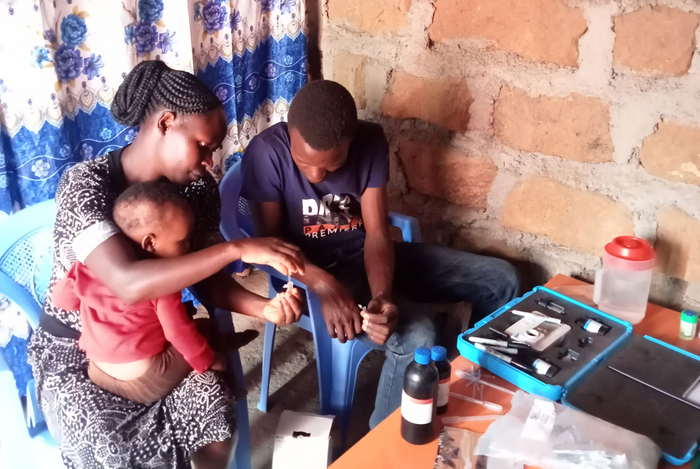EVANSTON, Ill. — Scientists from Northwestern University have collaborated on the implementation of an accurate, low-cost and easy-to-use test for detecting toxic levels of fluoride in water.

Credit: Credit: Janet Barsolai
EVANSTON, Ill. — Scientists from Northwestern University have collaborated on the implementation of an accurate, low-cost and easy-to-use test for detecting toxic levels of fluoride in water.
The new biosensor device developed at Northwestern has been field tested in rural Kenya, providing evidence that water testing for fluoride can be easily used outside of a lab and accurately interpreted by nonexperts.
Worldwide, it is estimated that tens of millions of people live in areas where the water supply is contaminated with toxic levels of naturally occurring fluoride, a colorless, odorless and tasteless substance. The scale of the issue has been difficult to measure because of the high cost or complexity of available testing options.
A major step toward addressing global health concerns over access to safe drinking water, the new proven testing method is the result of a rare collaboration between researchers in the fields of anthropology and synthetic biology.
Study findings will be published by NPJ Clean Water on Feb. 8, 2023, at 10 a.m. GMT/4 a.m. CST. After publishing the paper can be accessed here.
The study was co-led by Northwestern anthropologist Sera Young and synthetic biologist Julius Lucks. Young is an associate professor of anthropology and global health studies at Weinberg College of Arts and Sciences and a faculty fellow at the Institute for Policy Research (IPR). Lucks is professor and associate chair of chemical and biological engineering at McCormick School of Engineering. Lucks is also co-director of the Northwestern Center for Synthetic Biology, where Young is also a faculty member.
Young and Lucks say it is the first time they have collected field data together, and it shows what’s possible when social scientists and synthetic biologists put their heads together to address global challenges.
The project builds upon and finds a unique intersection for prior research conducted by both Lucks and Young, who are married.
In 2017, Young and colleagues developed the Water Insecurity Experiences Scales to provide a measurement of global water insecurity that takes human experiences into account. Young partnered with the Gallup World Poll to publish estimates for half of the globe using the WISE scale in 2022 in Lancet Planetary Health.
Prompted by Young’s research, Lucks and his lab began to investigate naturally occurring biosensors — molecules used by microbes to sense for the presence of contaminants. In 2020, they published work on repurposing biosensors in a cell-free synthetic biology system, allowing the detection of harmful water contaminants such as fluoride in the field, naming the technology platform ROSALIND.
To further Young’s research on improving global water security, the latest iteration of the Lucks Lab’s ROSALIND technology improved the speed and usability of the device to allow for easy transport to locations where harmful levels of fluoride are a safety concern.
The research team collected 57 water samples from 36 households in rural Kenya to evaluate the accuracy of the fluoride concentration measurement when compared with the gold-standard method of fluoride photometer. They also designed their studies to examine whether test results would be easily interpreted by non-expert users, a key indicator that the technology can have meaningful impact in addressing the global water crisis.
Results were excellent, showing that the point-of-use had an 84% chance of correctly predicting fluoride levels above the World Health Organization limit of more than 1.5 parts per million.
The tests also were found to be highly usable, with only 1 of 57 tests with an interpretation discrepancy between the user and scientific team.
“This is a whole new way to measure water quality,” Young said. “The study shows that we can get a test into people’s hands that is based on some very complex biology but works very simply.”
“It also points to the feasibility of such tests for other chemicals like lead and PFAS,” Lucks said.
Potential next steps for the point-of-use fluoride test could include mapping where geogenic fluoride is located globally.
Closer to home in Chicago, Young and Lucks are interested in investigating the usability of an at-home test for rapidly detecting lead in water, and in leveraging this study as a model for interfacing social sciences with synthetic biology to increase the impact of synthetic biology innovations.
The study, “The accuracy and usability of point-of-use fluoride biosensors: a field study in Nakuru County, Kenya,” will appear online Feb. 8, 2023, in Nature Partner Journals: Clean Water.
This work was supported by the Carnegie Corporation; Northwestern University’s Institute for Policy Research and the Crown Family Center for Jewish and Israel Studies; the support of the American people provided to the Feed the Future Sustainable Intensification Innovation Lab through the United States Agency for International Development Cooperative Agreement AID-OAA-L-14-00006; and the United States Army Contracting Command W52P1J-21-9-3023.
Journal
npj Clean Water
DOI
10.1038/s41545-023-00221-5
Method of Research
Experimental study
Subject of Research
People
Article Title
The accuracy and usability of point-of-use fluoride biosensors: a field study in Nakuru County, Kenya
Article Publication Date
8-Feb-2023




